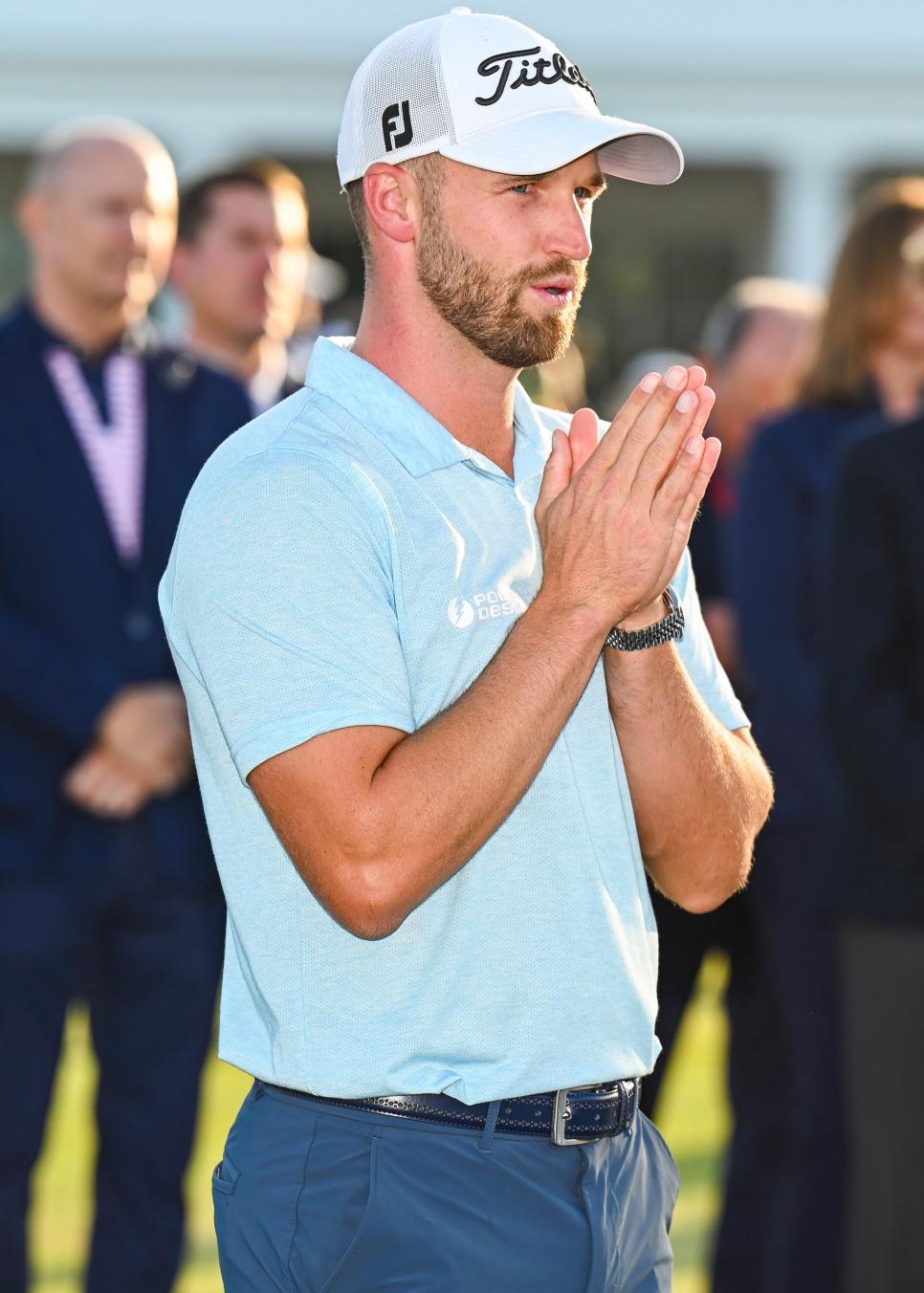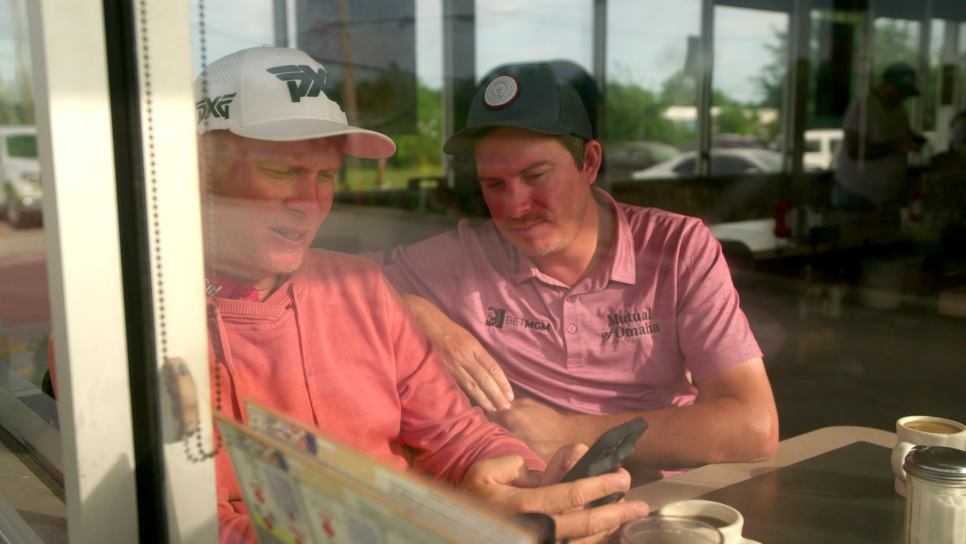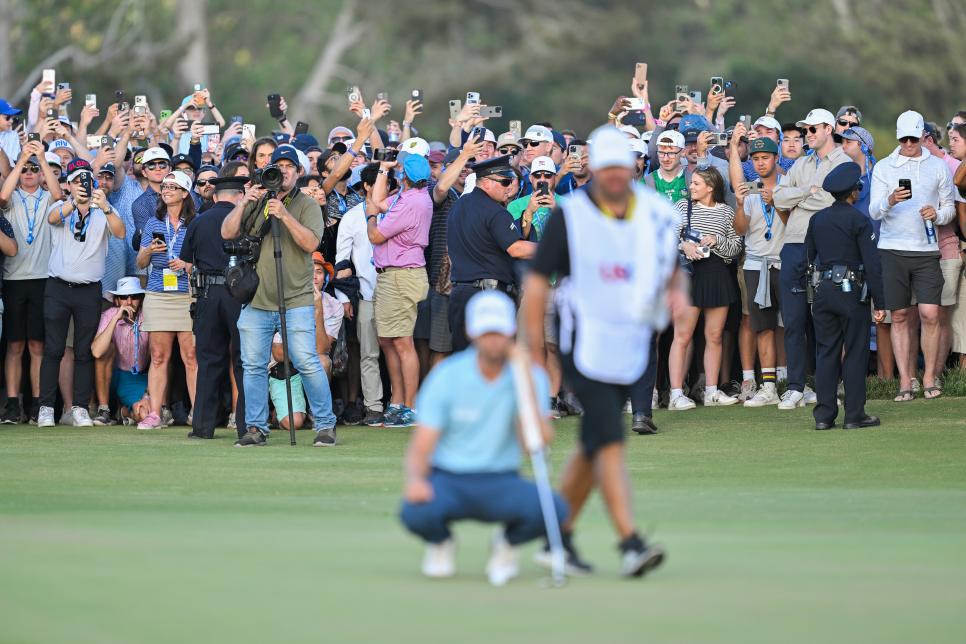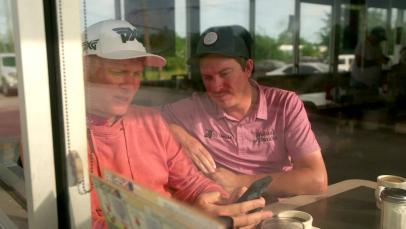Editor’s Note: Golf Digest is recapping and analyzing every episode of the second series of the Netflix golf series Full Swing. Last season’s recaps can be found here.
Season 2 Recaps: Ep. 1: The Game Has Changed Part 1 | Ep. 2: The Game Has Changed Part 2 | Ep. 3: Mind Game | Ep. 4: Prove It | Ep. 5: In the Shadows | Ep. 6: Pick Six | Ep. 7: All Roads Lead to Rome Part 1 | Ep. 8: All Roads Lead to Rome Part 2 | Bonus: Season 2 Review
The Story
Episode Title: “Mind Game”
Tagline: Newfound fame and fatherhood begin to affect Joel Dahmen’s game and personal life. Wyndham Clark gets help to cope with the pressures of pro golf.

Keyur Khamar
If you were sick of geopolitics sticking its ugly nose into your “Full Swing,” then get ready for a nice little palate cleanser in Episode 3, which is all about people. Two people, specifically—Joel Dahmen, who is not doing so hot in the wake of his new Netflix fame, and Wyndham Clark, a former prodigy who spent years in the wilderness before finding his stride.
We start with Dahmen, nominally, but in truth, we start with Netflix itself. “Full Swing,” as covered in previous recaps, is a show that is fully in love with itself, and here they have a justifiable reason to turn the camera on themselves. The first season of this show featured Dahmen and his delightful caddie Geno Bonnalie in their own episode, and it was by my estimation the best episode of the entire series by miles. When it was released, it increased Dahmen’s fame about a hundredfold. But it turns out that when thousands of drunken fans are shouting at you and demanding your attention every time you try to do your job—I hope you’re sitting, because this may shock you—there are downsides. And as Dahmen says in various ways throughout the episode his idea of hell is being “famous” courtesy of Netflix but playing like crap in front of all his new fans.
Dahmen is clearly in a dark place, and even though he’s finding fulfillment as a new father, his demeanor on the golf course is miserable. It’s clear as we watch that Netflix didn’t lack for clips of him leaning back, looking up at the sky and going off with some bit of self-abuse after bad shots, most often a simple “**** you” or “you idiot.” Bonnalie, for his part, is a picture of tolerance and good humor, but even he’s getting sick of it; in candid moments he confesses that he’s worried, and that Dahmen hasn’t been himself. “It’s almost dreadful,” he admits. Not only that, but the negativity is so oppressive that he’s started to think about what it might look like to get another bag. “There’s something going on upstairs that even I don’t know about,” he says of Dahmen.
He’s not the only one who’s concerned: Dahmen’s wife Lona knows it’s not working, she knows he’s “drinking to excess”—we see several nights of Dahmen absolutely blotto at some party—and she’s not afraid to read him the riot act. Even Bonnalie’s wife takes a few potshots from off-camera. The gist of it all is that they want him to see a sports psychologist, but Dahmen is resistant because a grief counselor he saw in high school after his mom’s death left him with a bad taste in his mouth regarding therapy in general.
Wyndham Clark was resistant to seeing a sports psychologist, too, but when his caddie John Ellis and some others close to him insisted, he started meeting with Julie Elion, who features heavily in the episode. Unlike Dahmen, Clark was a thoroughbred out of college who was expected to be on the level of Jordan Spieth and Justin Thomas, but who lost his own mother while in college and was left anchor-less. Over time, his mentality on the course devolved to the point that, by his own estimation, he was locking himself in rooms, being mean to those around, speaking negatively to himself and drinking to blunt the thoughts. Now, with Elion’s help, he has established an almost Buddhist mentality and focuses on concepts like gratitude.
What's Joel Dahmen been up to this past year?
Take a look for yourself in this first look at Full Swing Season 2, coming in 2024! pic.twitter.com/DfDEVxBq7w
— Netflix (@netflix) November 15, 2023
Clark wiped out some his past on-course demons with a massive win at the Wells Fargo, and heading into the U.S. Open, he and Dahmen were on very different paths. At LACC, Dahmen missed the cut in what is portrayed as a rock-bottom moment, while Clark continues his hot play and comes into the final round tied with Rickie Fowler. Anyone who watched that round remembers what came next; Clark was in plenty of trouble, but showed great resilience on a tough course under unspeakable pressure and emerged as a major champion by a shot over Rory McIlroy.
That’s Clark’s catharsis, and Dahmen’s comes on a plane, when he vows to Bonnalie that he’s going to start taking the game seriously again and work toward a place where he can thrive. Bonnalie looks out the window, trying to hide his tears, and Dahmen stands over him and hugs him as they fly over the Rockies. He frames it as a turning point, and Bonnalie wants to believe him, but the scene ends with Bonnalie making it clear that they can’t go on together the same way, and that a change has to come.
The Good Stuff 
Netflix
—For my money, this is the single best episode “Full Swing” has ever made, beating out the Dahmen/Bonnalie episode from last season. This gets back to a point I have made ad nauseam—and which makes me sound like a broken record—but keeps proving true: When “Full Swing” focuses on actual people and resists trying to force a narrative down our throats, it can be great. I’m not saying this is easy; a lot of subjects on this show lack all charisma, and obviously, they’re bound to cover things like the LIV schism. It’s just that when politics and overarching storylines intrude, they seem to fall back on their worst storytelling instincts. Here, the formula isn’t even that different—”Full Swing” lives on single-episode contrasts, whether it’s two people or two groups or two ideas—and this is the same, with the opposite trajectories of Dahmen and Clark forming the core narrative. But it works here where it fails elsewhere because the filmmakers seem comfortable letting the story flow from its subjects, rather than imposing a story on them. That is almost definitely easier with guys like Dahmen, Bonnalie, and Clark, but episodes like these are both phenomenal in their own right, and also leave you with a sense of what “Full Swing” could be … because frankly, this episode is so much better than what came before that it’s almost like a different show.
—For the second straight season, the relationship between Dahmen and Bonnalie brought me to tears. It’s incredible how honest they are, in good times and bad, with the camera. Wives included! When you think of how buttoned up or image-conscious other subjects are, to have Lona and Geno speak sincerely about what might be a drinking problem with Dahmen, or to speculate about his mentality, and for Dahmen to reflect that honesty and also let himself be filmed at his lowest moments, is pretty stunning. The scenes where he was drunk at some party or other were particularly poignant, because you can almost see a guy on the descent, and nobody is trying to hide it.
—The scene with Dahmen and Bonnalie on the plane was a stunner, and not just because they had their emotional come-to-Jesus moment. The ambiguity of the ending, where you want it to be just a turning point—Dahmen actually uses those words—but there is still a great deal of uncertainty on Bonnalie’s part, is a subtle depiction of the reality of these situations that resists the black/white dichotomy of a simpler narrative.
ME, having never played golf and not knowing anything about golf but am four episodes into Full Swing on netflix: I WOULD GIVE MY LIFE JOEL DAHMEN
— Shea Serrano (@SheaSerrano) February 19, 2023
—Clark is depicted throughout almost like a samurai, frequently by himself in dark rooms, listening to therapeutic tapes and meditating. He doesn’t have the outright wit of the other subjects in this episode but his sincerity feels legitimate. I thought he ended up being one of the most fascinating subjects they’ve profiled.
—Clark and Dahmen were obviously both profoundly affected by the early loss of their mothers, in ways that still echo in their lives, and the way “Full Swing” chose to tease this out was, at least to me, incredibly elegant. This is them at peak storytelling.
The Duds 
Ben Jared
—Nothing. I genuinely can’t criticize this episode. It was great TV brilliantly told, full stop.
—Oh wait, yes I can, because nothing is perfect. First, I should issue an apology for knocking “Full Swing” for a very limited breakdown of the U.S. Open final round in Episode 2. I didn’t realize they were coming back! My bad on that. BUT, I still wanted more from that final round. They earned the right in this episode to go really deep on what happened on the course, but it was still largely glazed over. There was good material on the trouble he found on eight and nine, yes, but the back nine got short shrift, and we skipped over his infamous drive on 18 altogether! So far in this season, “Full Swing” has really gotten away from the actual golf, and I wish they’d break it down more.
More from Golf Digest  ‘The Loop’ We found out the hilarious thing Joel Dahmen and Geno Bonnalie were actually doing at Waffle House in ‘Full Swing’ Stray Thoughts
‘The Loop’ We found out the hilarious thing Joel Dahmen and Geno Bonnalie were actually doing at Waffle House in ‘Full Swing’ Stray Thoughts
—The awkwardness of Bonnalie’s wife Holly chiming in on Dahmen’s trauma from off camera was a little excruciating but irresistible. You’re simultaneously thinking, “She’s right,” but also, “It’s wild that she’s saying this on camera and I wonder if it’s going to make things uncomfortable later.” But knowing this crew, and how open they are with each other, it probably won’t.
—Joel Dahmen’s kid seems to have better aim than his old man, am I right folks?
—I thought Jordan Spieth and Rickie Fowler hitting balls at Adam Hadwin’s port-a-potty was a terrific way to start an episode, but Dahmen having to sweep his pool three times a day when it was supposed to provide entertainment and not extra work was hilarious. And I’ve never related to him more than when he contemplated the idea of doing it three times per day, and just said, “no chance.”
—I’m also with Dahmen on this: If you’re going to have a bunch of gravy boats, have some gravy.
—Lona is a champ at shotgunning champagne, and that weird little glass blew my mind. Are those normal? Have normal people seen the combo champagne flute/funnel before?
—Yes, Geno, it’s OK to say it, you are the most popular caddie. You’ve earned it, buddy.
What's better?
An autograph from @GenoBonnalie or Geno asking for 𝙮𝙤𝙪𝙧 autograph? pic.twitter.com/7P6U5KPmDR
— PGA TOUR (@PGATOUR) December 10, 2023
—Oh wait, I found something I relate to Dahmen more on: Standing over a birdie putt, praying out loud to make it, but not believing for a second that you will. (Except, for me, change “birdie” to “triple bogey.”)
—There are so many little moments that showed exactly how rough things were, but Geno asking if Dahmen wanted to hit balls after the round, and his smile somehow widening into disappointment when Dahmen said no, was maybe my favorite.
—”Before you know it, you’re drowning.” Lines like that are why Dahmen is such a terrific subject.
—Julie Elion seems cool, and I wish we got a little bit more on the actual work they do together.
—Like I said, Clark is more inward than Dahmen or Bonnalie, but he’s somehow great at expressing his internal life. What stuck out for me was his analysis that after his mom died, the most he got out of other people was “golf, sports, weather, the BS people talk about that doesn’t have any meaning in life.” He even admits to anger at his mom that she wasn’t there, which is such an honest place to go to.
—I also loved that he had his Michael Jordan “and I took that personally” moment at LACC, when literally everyone in the gallery was pulling for Rickie or Rory.
—If you’ve ever watched “Full Swing” before, you knew exactly what was coming when Clark reached the green in two on 18: weepy indie pop music! I couldn’t even find the name of this song or Google the lyrics, and Shazaam told me it was “Dust in the Wind” by Kansas (nope), so I suspect it’s some stock song. But man, it really fits their theme.
—How great is Rickie Fowler? In the midst of his heartbreak at losing the U.S. Open, he has the wherewithal to tell Clark that his mom would be really proud of him, and he attempts to do it at a low enough volume that nobody can hear. Classic Rickie to pop in and make you like him even more in an episode where he barely features.
—”I don’t even know why I like you.” Love that quote from Geno at the end.
Final Assessment
What more is there to say? Everything about this was great. It’s the best episode they’ve done, ever, and as I press on with Season 2, I really doubt they can top it. Hats off, “Full Swing.”
Listen to our ‘Full Swing’ reaction episode of The Loop podcast here:
This article was originally published on golfdigest.com




